- Home
- Carrie Jones
After Obsession Page 5
After Obsession Read online
Page 5
“It’s different.”
“Why’s it different?”
He pauses. “Because I’m a guy.”
“No,” I say in what I hope is a peppy, upbeat way. “What you are is a Cranky McCrankerson.”
Chris Paquette is in the backseat, sitting with Eric. “Truce, children. Let’s admit that Blake is sexist and cranky and move on from there.”
“What I am is pissed,” Blake admits. He turns down the music so nobody has to yell over the hard slow beats of it. He twists his head to glare at me instead of the road. “Aren’t you going to ask me why?”
I bite even though I don’t want to. Part of what I like about Blake is that he’s a pretty positive person. I tend to shy away from the negatives. Still, I ask, “Why?”
“Courtney’s stupid cousin trounced me today. He was like some sort of superhero,” Blake says.
“He killed him.” Eric leans forward between the seats. “He’ll be first man. Blake’ll be second. I’ll be third. Toby and Dalton? Four and five. We have a definite chance for state as a team this year, not just individuals.”
“I hate losing to someone like him,” Blake mutters.
Eric and I exchange looks.
“Someone like him?” I repeat, turning back forward in my seat. Does he mean because he’s Native American? Or because he’s poor? Or a metalhead? None are good. Anger creeps into my throat and shame hits me hard right in the middle of the chest. “What do you mean?”
“Nothing,” Blake grunts.
Nothing? I wipe at my forehead, trying to figure out what’s happened lately to sweet, nice, overachiever Blake, trying to figure out how someone’s entire personality can change. He’s not the only one, though. Everyone is getting crankier, meaner somehow. You can feel it in the air. We pass the Congregational Church and head down the Bucksport Road.
“Let me off first,” I say.
As soon as I get in the door, Gramps hands me an oatmeal raisin cookie and says, “Your brother’s being temperamental.”
I bite the cookie. It’s still warm. “How come?”
“Some brat beat him up at school today.” Gramps throws a dish towel over his bony shoulder. “The principal said there have been fights every damn day. She doesn’t know what’s going on. She sounded just about ready to throw up her hands on the lot of them. Anyway, I told your brother he had to fight back. He told me he was a pacifist. I told him there are no pacifists allowed in this house. Go talk to him, Aimee.”
“Me?”
“He needs a woman’s touch, and you’re so good at making people calmer.” Gramps tries to smile in a charming way. “I’ll make you more cookies.”
“Fine.”
Maybe thinking about Benji will keep me from thinking about Alan. Maybe it’ll keep me sane. Who knows? Maybe it’ll keep me from remembering my dreams.
Poor Benji’s climbed up into the tree house we made him last year for his birthday. It’s an A-frame and has a ladder, a deck, and a pretty awesome view of the river. You can smell the salt of the ocean on the wind today. I like that smell.
He’s not all curled up and fetal, not sobbing his heart out or anything, which is what I was worried about. Instead, he’s chucking twigs off the tiny deck, throwing as hard and as far as he can. As I haul myself up, a twig smashes into a tall fir tree. A squirrel gets spastic about it.
“You are such a boy,” I say, sitting on the plywood.
He grunts.
“You are.”
He shrugs, but something in his face shifts. He snaps a twig in half and kicks some pine needles off the deck. They tumble to the ground. He starts sweeping all the needles off the wood, cleaning house.
“So, what’s going on at school?” I ask him.
“You don’t care.”
“Right, that’s why I’m up here in your tree house watching you kick pine needles instead of getting a snack, or doing my homework, or painting.”
“You’re just avoiding Gramps.”
I drop my butt down on the deck and pull my knees up to my chest. “Sometimes Gramps is a pain.”
“At least he’s here,” Benji says. He reaches into the back pocket of his jeans, pulls out a very used tissue, and blows his nose.
“What do you mean?”
“Mom’s not here.”
“She can’t be here anymore, Benj. You know that. She died.”
He scrapes at the corner of his eye like he’s getting out those sleep crud things that are there in the morning, only it’s not morning. Then he says, “Dad’s never here.”
“He has to work.” It sounds like a lame excuse, just like when Dad says it, but it’s true. Dad’s not a bad dad. He’s just a dad with a busy job. I switch tactics. “That’s an awesome goose egg on your forehead. Did you get in a fight?”
“This kid said Mom was mental.”
I pull in a big breath. “Mom had a disease, a disorder. Bipolar disorder. Right? You know that.”
He shrugs.
“She wasn’t crazy,” I tell Benji, the same way Gramps told me a million times right after she died. “She wasn’t crazy. She was ill. She was still beautiful and good and kind, but she sometimes couldn’t control how she felt.”
“What’s the difference between crazy and sick?” Benji asks.
I think about how sweet our mom was most of the time; how she’d put her hand on my forehead when I didn’t feel good; how she’d hug me and I’d feel so safe; how she could sing lullabies that were softer than bird wings. She just got lost sometimes.
But I don’t say anything about any of that. I just say, “I’m not sure.”
The squirrel rattles off a list of our crimes at us. He jumps up and down on a branch, shaking his paws—hands—at us.
“That squirrel’s got a serious problem,” I tell Benji.
There’s this huge pause and it’s like the entire world is waiting for what Benji’s going to say next. He says, “I think our house is haunted.”
“Me, too.”
His face lights up. “Really?”
“Yeah. I was thinking maybe it’s Mom, just visiting us, checking in, you know? I can almost smell her vanilla soap sometimes. Do not look at me like I’m crazy, Benji.” And I start to say more, but then the freaking squirrel throws an acorn at me. An acorn! It hits the side of my shoulder. “What the heck!”
Benji’s eyes get huge. “He attacked you!”
Another acorn comes pelting down. It hits the deck between us and skitters over the side.
“Don’t attack my sister!” Benji screams. He starts throwing twigs at the squirrel.
“I thought you were a pacifist,” I say.
Benji raises an eyebrow at me. “Not when it’s my sister. Duh. I was just trying to make Gramps mad.”
“Look! He’s got backup,” I say, pointing at two other squirrels.
“Attack!” Benji yells.
I grab a pinecone and throw it. “Leave us alone!”
“Loser squirrels!”
“Jerks!”
We keep throwing things at the squirrels. I don’t know what we’d do if we actually hit them or anything, but it feels good, somehow, me and Benji battling off the world. Squirrels scurry up higher into branches, leap from one to the other, away.
“They’re retreating!” Benji jumps up and down, pumping his fist in the air.
“Dude, we rock.” I give him a glam rock-’n’-roller hand signal, and he hugs me. I don’t ask him if he feels better about the bully boy now. I don’t say anything stupid and parenty and chirpy, because I don’t have to. I just know. “Does your head hurt?”
“A little.” He scrapes the toe of his shoe against the plywood, sweeping off a few last pine needles. “You want to touch it?”
“You want me to?”
“Sometimes you make things feel better.”
He says it very matter-of-factly. My palm presses lightly against the bump on his head. My hand starts to tingle in a circle right where I’m touching him. His face relaxes. I pu
ll my hand away. “Better?”
“Way better.” He reaches up to touch it and asks, “Is it smaller?”
“Half the size.” I smile.
“I wish I could do that. Gramps said Mom could do that. I tried to ask Dad about it, but he got all mad.”
“It’s nothing.”
“It’s not nothing. You always say everything you do is nothing. Painting is nothing. Soccer is nothing. It drives me crazy!” He glares at me.
“Sorry,” I offer.
“Hmph. Why does Dad get mad about stuff like that?”
“I think it makes him miss Mom too much,” I say, and don’t add that I think he worries that if I’ve inherited her healing traits, then I’ve probably inherited her bipolar disorder, too. Instead, I check out the plywood of the tree house and say, “You want to paint this?”
His eyes widen. “Really?”
“Yeah.”
“Can it be like a mural with dragons and knights and stuff ?”
I imagine the scenes on the slanted plywood, knights defending ladies’ honor. Dragons screaming fiery threats. “That would be cool.”
“I can help, right?”
“Of course you can help.” I tussle his hair like any good American McSister would do. And for a second we are it: the American McDream.
But we aren’t any McDream. Our mother is dead. Our dad is MIA most of the time. My boyfriend is maybe a closet racist, which means he cannot be my boyfriend anymore. My best friend is so sad.
And me?
Sometimes lately it feels like everything in the world is so heavy, just pulling me down, and I wonder if that’s how my mom felt when she was in a depressed place, when she would stare at that river, just stare and stare.
Something splashes in the water. A cloud shades the sunlight.
“Aimee?” Benji’s voice comes out in a scared little squeak.
I grab his hand and squeeze it. “What, sweetie?”
“Ghosts can’t hurt you, can they?”
I make my voice as serious and calm as I can. “Not if I can help it. Okay?”
He pulls his lips in and then lets go. “Okay. And if they did, you’d heal me all up, right?”
“Right.”
When I hear the minivan start rumbling up the driveway, I hop out of the tree house and corner my dad by the garage.
“Hey, kiddo,” he says, pulling his long legs out of the car. He opens his arms for a hug. I step into them.
“You had spaghetti for lunch?” I ask, pulling away a bit.
“Leftovers. How’d you know that?”
“Your tie smells like spaghetti sauce.”
He grabs this leather satchel thing out of the car. He uses it like a briefcase. I take some mail and his travel coffee mug. He turns to go into the house.
“How was school?”
“Okay.” I block his way. I swallow. He stares at me, waiting. He’s not a stupid guy, my dad; he knows something is up.
“What is it, sweetie?”
An eagle circles over us, higher and higher circles. “Benji misses you.”
He squints. “What do you mean?”
“He just needs you, you know. You’ve been working a lot lately.”
He steps back. “Things have been hard at work …”
I won’t let him get away with that. “Dad.”
“You’re right, no excuses.” The briefcase dangles from his fingers. “I’ll try to do a better job, okay?”
My breath flies out. “It’s just, Gramps has been super cranky lately and everything, and I’ve been at soccer a lot, and there’s some bully jerk beating on Benji at school, and he just needs you; he’s a little vulnerable right now.”
This stops him.
“Aimee,” he says. “When are we not vulnerable?”
• 6 •
ALAN
At home I grab a granola bar from a cabinet and change into sweatpants and running shoes. Courtney goes straight to her room and slams the door. I leave my room and call out, “I’m going for a walk.”
She doesn’t answer, so I gallop down the stairs and out the front door, leaving it unlocked because I still don’t have a key. There are woods behind the house and I want to explore them. I go to the end of the block, turn, and follow a trail toward the tree line.
Woods are something we don’t have in Oklahoma. Not like this. Not where I lived in the city. When I turned sixteen and got my driver’s license I had to drive from Oklahoma City to Thunderbird Lake out past Norman to find real forest. I told Mom I was sleeping over at Chance Botkin’s house for a couple of nights, then went to the state park for my vision quest.
I read what I can about American Indians in general, but focus mostly on the nations of the Southwest, specifically the Navajo. At puberty, I learned, boys would go on a vision quest, where they’d find their totem guide, and sometimes even learn their purpose in life. I fasted for two days before my trip to Lake Thunderbird. When I got there I gutted the floor out of my canvas tent and created a little sweat lodge—as best I could—inside the tent. I sat in it for the first morning, still not eating. After the sweat lodge experience, which was really intense, I read all the prayers to the Great Spirit I’d found in books and on the Internet.
That night I chewed a small piece of the peyote I’d also bought on the Internet. Three days without food, a morning in a sweat lodge, then chewing peyote. Yeah, who wouldn’t have visions? If it wasn’t for the things now in my medicine pouch, I might have believed what I saw were only hallucinations.
That’s where Onawa came to me. Different totem animals represent different things. The cougar is supposed to be a leader, conscious of its own strength, and a messenger between humans and gods or spirits. People with a cougar totem are supposed to have those traits, too. I’m not sure I do.
My medicine pouch bumps my chest as I climb a short rise into thicker trees. It is so quiet here. Very still. The ground is soft and springy with old pine needles. The air is moist and heavy. The only sound is my own feet moving me forward. I top the rise and look down a gentle slope filled with more trees. At the bottom I can see the sparkle of water. It has to be a river. I make my way down the hill until I come out of the trees onto the bank of the river. It’s slow here, but looks pretty deep. I’ve seen the ocean when we were driving around; this must feed into it.
“What I wouldn’t give for a canoe right now,” I mutter. My voice seems alien here, just like I seem alien here, but the thing is, I really like the river and the trees. Still, it wasn’t just the football issue that made me angry about moving here. It was also my dad. I know that he’s never tried to find me, but moving here? It makes it seem like I’ll never find him, either.
I make my way back up the hill, out of the woods and onto the street. The evening is getting dark. Lights are on in the houses between the end of the road and Aunt Lisa’s. As I get closer, I see that Courtney has turned on her bedroom light. Then I stop. There’s a shape silhouetted in her window.
It’s a man.
A big man.
All I can see is a tall, broad-shouldered black shape on the other side of her thin pink curtains. The shape seems to be looking out the window. Looking at me.
I sprint for the house, throw open the door, and fly up the stairs. I hesitate at Courtney’s door, then grab the knob and fling it open. It smells like roadkill baked in the sun. Courtney’s on her bed. She jumps up when I rush in. She tries to hide a book behind her as she starts screaming at me.
“What the hell are you doing? Get out! Get out of my room!”
She’s completely alone.
“I thought I saw somebody in here,” I say. “A man. I thought—”
“Get! Out! Now!”
I leave. I close the door and go to my own room, where I throw myself on the bed. “Psycho bitch from hell,” I tell the ceiling.
There was no man in her room. Just her, the smell of decay, her girly stuff, and some book she didn’t want me to see.
I get off the bed a
nd go to my stacks of boxes and start unpacking the things I brought with me from home. My real home. A few minutes later my cell phone rings. It’s the first call I’ve had since moving up here. I still have an Oklahoma number, of course. The ringtone is Danzig’s “Mother,” which means it’s Mom calling me.
“Come outside,” she says when I answer.
Headlights flash through the windows as a vehicle turns into the driveway. They’re followed by a second set. I could look out, but I don’t. I just go downstairs and out the front door, and there’s Mom and Aunt Lisa beaming at me in front of a sweet 1972 Ford F-150 pickup that appears to be in cherry condition.
“If you like it, he said I can bring your money tomorrow,” Mom says. She’s almost bouncing. “Lisa called and he e-mailed us some pictures and I knew it was perfect for you.”
I make myself stop and give her a hard and tight hug before I open the door and slide into the cab. Finally, I am mobile again. Independent. Sweet!
“I’m going to take it for a spin,” I announce, my hands gently stroking the big old steering wheel, then the gear shift, down to the ignition.
“I don’t know, Alan,” Mom says. “You don’t have insurance on it. You don’t even have a Maine driver’s license.”
“Oh, Holly, leave him alone,” Aunt Lisa argues. “Alan, stay in the city limits. If Nathan Wainscott pulls you over, you just tell him who you are and that you bought this truck from John Farley tonight.”
“Nathan Wainscott?” I ask.
“He’s the night cop,” Aunt Lisa says. “Don’t do anything wrong and he won’t bother you.”
“I won’t,” I promise. I turn the key and the engine roars to life, then idles as smooth as silk. I know I’m grinning like an idiot.
I close the door and drop the gearshift into reverse. The truck rolls out of the driveway. The brakes feel firm. I put it in drive and tap the accelerator. The old Ford eases forward, and we’re off. There are no misses, no knocks, no odd sounds at all, and no lights on that shouldn’t be. The heater blows hot. The radio works. The wipers work. No air-conditioning, but maybe they don’t need that in Maine.
I soon realize just how small Goffstown is. This town would be jealous of a speck on the map. I drive through neighborhoods, past a grocery store, around the high school, along a bumpy back road, and finally end up back at Aunt Lisa’s house. I park behind her SUV and kill the engine.

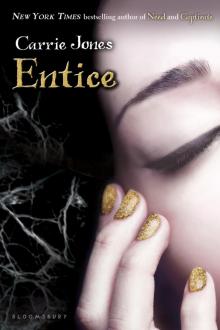 Entice
Entice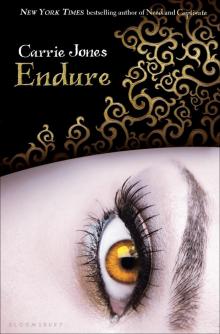 Endure
Endure Need
Need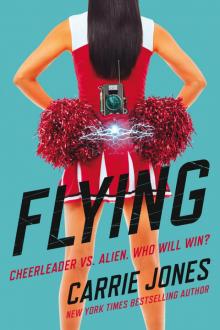 Flying
Flying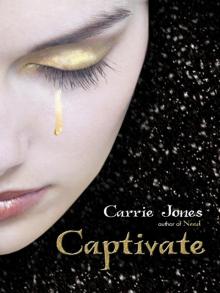 Captivate
Captivate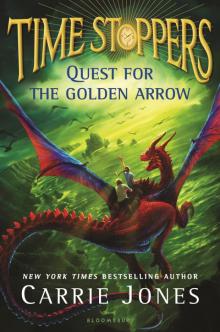 Quest for the Golden Arrow
Quest for the Golden Arrow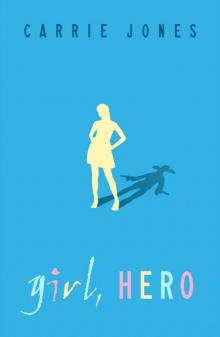 Girl, Hero
Girl, Hero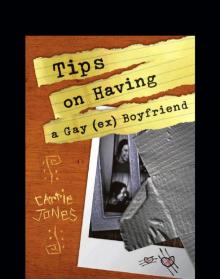 Tips on Having a Gay (Ex) Boyfriend
Tips on Having a Gay (Ex) Boyfriend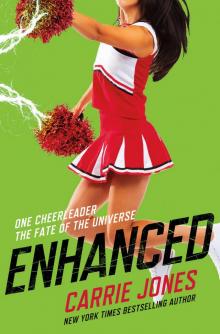 Enhanced
Enhanced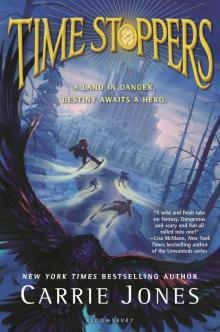 Time Stoppers
Time Stoppers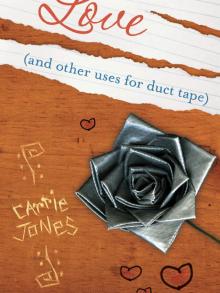 Love (And Other Uses for Duct Tape)
Love (And Other Uses for Duct Tape) Wolf's Hunger
Wolf's Hunger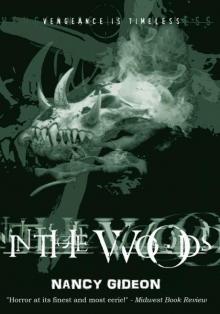 In the Woods
In the Woods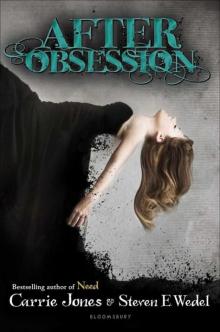 After Obsession
After Obsession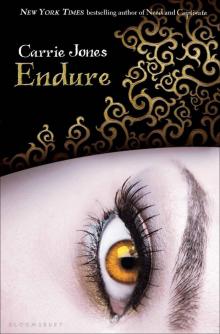 Endure (Need)
Endure (Need) Need np-1
Need np-1